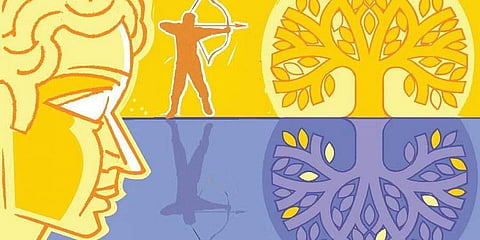
- LIFESTYLE
- FASHION
- FOOD
- ENTERTAINMENT
- EVENTS
- CULTURE
- VIDEOS
- WEB STORIES
- GALLERIES
- GADGETS
- CAR & BIKE
- SOCIETY
- TRAVEL
- NORTH EAST
- INDULGE CONNECT

In the last two years, I quit my job at Microsoft, moved countries, started a new company, wrote two books, got married and became a Fellow at Oxford. I was fairly efficient and managed to get a lot done. That said, in my quest for productivity, my creativity suffered. I wasn’t able to think and reflect on where I was going and who I was becoming.
Being busy is easy. Carving out space for creative pursuits is the hard part. Being creative needs an uncluttered mind. One can’t hope to be running from pillar to post and keep generating new ideas. One needs to take regular pauses to explore new things, tinker around and wander.
The Productivity Seduction
We have been seduced by loud proclamations of hard work and hustle culture. Let’s explore why. First, they confuse being busy with being effective. Second, they unintentionally standardise aspirations. Third, and most important, they make it seem like pivoting or changing course of action is a sign of weakness.
Meaningful careers are a result of goal-orientation, discipline and intentional experimentation. Unfortunately, the incentive structures in schools, colleges and most workplaces are antithetical to calculated experiments and evidence-based decision-making. They are designed to help us improve without questioning the underlying framework of evaluation. Instead of encouraging us to change tracks in face of evidence or design frameworks that work for us, they nudge us into a weird competitive game with ourselves and our peers.
If you are trying very hard, and yet finding yourself uninspired and exhausted, you are most likely playing the wrong game. No matter how many hours you put in, things won’t change. Fortunately, I love what I do and find meaning in the portfolio of careers I have woven together. If I, however, want to succeed in the long run, making creativity and thoughtful experimentation part of my daily routine would be vital.
Importance of Creativity in a Fast-Changing World
According to a Institute for the Future report, 85 percent of the jobs of 2030 don’t exist yet. No one really knows what sectors and industries will be in vogue, but it is obvious that following trends and mindsets of the past will be foolhardy. We need a new, experimentation-driven approach, which is the bedrock of creativity.
Productivity is about doing more with less. It is focused on efficiency. Creativity has less to do with output. It is about building a new frame of reference to explore new opportunities and solve thorny challenges. With the proliferation of productivity softwares and networking tools, we end up spending most of our time connecting with other people. We are exposed to new ideas, but find ourselves with almost no time to process and synthesise. The result is that we are in a constant state of flux.
Taking Baby Steps
My life is perhaps going to be as busy, if not more, in the years to come, but at the start of the year, I took a solemn vow to take creativity seriously. Here are three simple techniques that seem to be working:
First, schedule time for thinking. Every day from 6-6.30 pm, I do nothing, but sit quietly and reflect on the day gone by. I try to ask myself what I could have done differently during the day and what I could have tried out. Second, I got back to hobbies. I love to act. I joined the theatre group in Oxford and spend my weekend evenings rehearsing. This has been game-changing. Immersing myself in the artform made me remember the thrill of being on stage. I now have something beyond work I truly look forward to.
Hobbies should be pursued for their own sake, but they also have a huge impact on our work lives. Nobel laureates are at least 22 times more likely to partake as an amateur actor, dancer, magician, or other type of performer.
Creativity researcher Dean Keith Simonton observed, “Rather than obsessively focusing on a narrow topic, creative achievers tend to have broad interests. This breadth often supports insights that cannot be attributed to domain-specific expertise alone.”
Third, learn to say no more often. In my early 20s, I said yes to every exciting opportunity. It gave me wide-ranging experiences that shaped my outlook.
I, however, kept up the habit for years after. I learned it had diminishing returns. I would often get overwhelmed by the sheer volume of stuff I had to get done. It took away some of the joy out of work. Now I say no to most things.
These are all baby steps towards a more creative life, but so far the results have been promising. I hope that in the next two years, I am able to share more about my creative projects. Just thinking about the realm of possibilities leaves me energised.